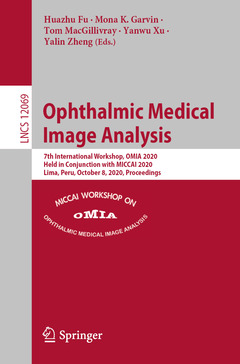Description
Ophthalmic Medical Image Analysis, 1st ed. 2020
7th International Workshop, OMIA 2020, Held in Conjunction with MICCAI 2020, Lima, Peru, October 8, 2020, Proceedings
Image Processing, Computer Vision, Pattern Recognition, and Graphics Series
Coordinators: Fu Huazhu, Garvin Mona K., MacGillivray Tom, Xu Yanwu, Zheng Yalin
Language: English
Subject for Ophthalmic Medical Image Analysis:
Keywords
artificial intelligence; color image processing; color images; computer vision; computer-aided detection; deep learning; image analysis; image processing; image quality; image reconstruction; image segmentation; machine learning; medical images; neural networks; ophthalmic imaging; pattern recognition; signal processing
218 p. · 15.5x23.5 cm · Paperback
Description
/li>Contents
/li>
The 21 papers presented at OMIA 2020 were carefully reviewed and selected from 34 submissions. The papers cover various topics in the field of ophthalmic medical image analysis and challenges in terms of reliability and validation, number and type of conditions considered, multi-modal analysis (e.g., fundus, optical coherence tomography, scanning laser ophthalmoscopy), novel imaging technologies, and the effective transfer of advanced computer vision and machine learning technologies.




